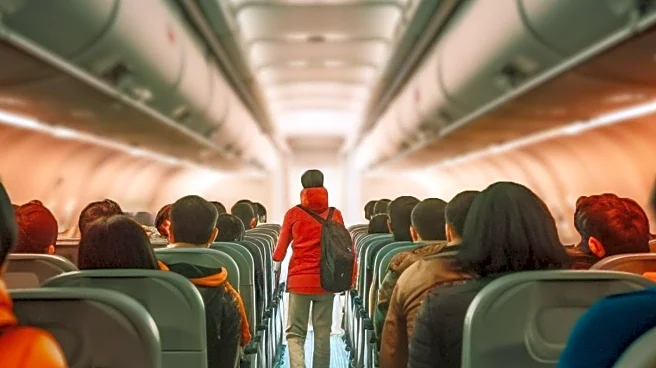What's Happening?
Flight attendants are addressing common misconceptions about their profession, emphasizing their role as trained safety professionals rather than merely service providers. The public often views flight attendants as 'waitresses in the sky,' focusing on food and drink service, but industry insiders highlight their extensive training in emergency procedures, CPR, firefighting, and de-escalation. The job involves ensuring passenger safety, managing emergencies, and enforcing aviation regulations. Flight attendants undergo rigorous training and annual exams to maintain their licenses. Additionally, the perception of a glamorous lifestyle is challenged, as many flight attendants face long hours, jet lag, and irregular schedules, often with minimal layover time for rest or sightseeing.
Why It's Important?
Understanding the true responsibilities of flight attendants is crucial for appreciating the complexity and demands of their role. This awareness can lead to better treatment and respect from passengers, who may otherwise underestimate the challenges faced by flight attendants. The misconceptions can contribute to unrealistic expectations and misunderstandings, impacting the morale and job satisfaction of flight attendants. By clarifying these myths, the industry can foster a more informed and respectful environment for both crew and passengers, potentially improving service quality and passenger experience.
What's Next?
Airlines may continue to address these misconceptions through public awareness campaigns and training programs that highlight the critical safety roles of flight attendants. As negotiations for better compensation and working conditions continue, particularly regarding boarding pay, flight attendants may see improvements in their work environment. The ongoing strike by Air Canada's flight attendants over boarding pay highlights the industry's need to reassess compensation structures and recognize the full scope of flight attendants' duties.
Beyond the Headlines
The discussion around flight attendants' roles also touches on broader issues of labor rights and fair compensation in the airline industry. The push for boarding pay and recognition of non-flight hours as part of their work reflects a larger movement towards equitable labor practices. Additionally, the increased radiation exposure faced by flight attendants due to high flying hours raises health concerns that may prompt further research and policy changes to ensure their well-being.









